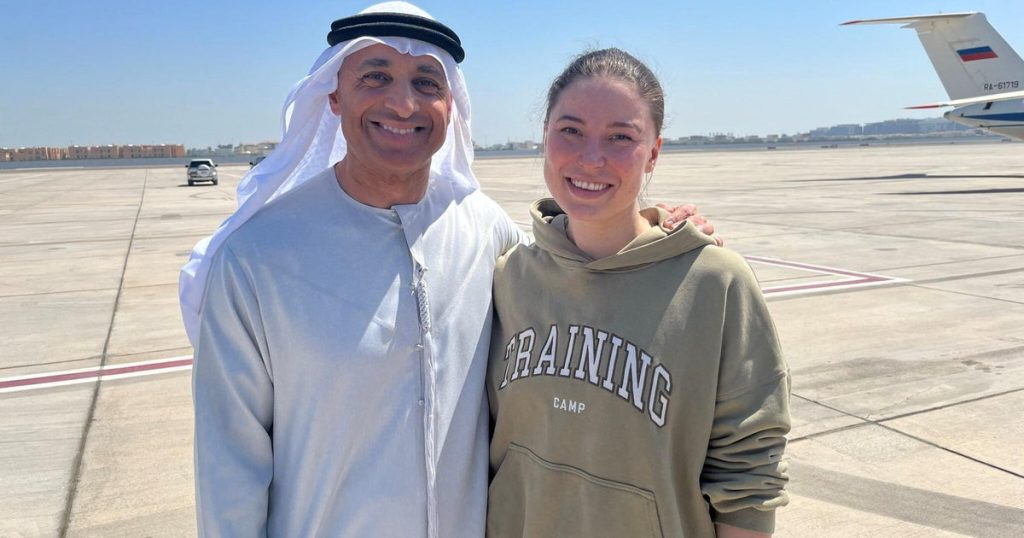In a significant diplomatic move, Russia has released Ksenia Karelina, a dual U.S.-Russian citizen, who was sentenced to 12 years in prison for treason last August. Her release, confirmed by U.S. Secretary of State Marco Rubio, is part of a high-stakes prisoner swap orchestrated by intelligence agencies from both nations. Karelina’s return marks a key development in ongoing efforts to ease U.S.-Russia tensions, as both nations navigate complex geopolitical challenges.
| Article Subheadings |
|---|
| 1) Details of Karelina’s Release |
| 2) Background of the Prisoner Swap |
| 3) Implications of the Swap for U.S.-Russia Relations |
| 4) Public Reaction to Karelina’s Situation |
| 5) Current Status of Other U.S. Nationals in Russia |
Details of Karelina’s Release
The release of Ksenia Karelina occurred during a prisoner swap that involved high-level negotiations between U.S. and Russian officials. As confirmed by several U.S. leaders, including Secretary of State Marco Rubio, Karelina is now on her way back to the United States. Her wrongful detention spanned more than a year, during which she was imprisoned under accusations stemming from a modest donation she made to support humanitarian efforts in Ukraine.
Karelina’s release underscores the complexity of international diplomacy, involving not just the release of one individual but also the broader implications of U.S. foreign relations. In a statement, Rubio noted that President Trump played a pivotal role in her release, emphasizing the administration’s commitment to negotiating for Americans wrongfully detained overseas.
Background of the Prisoner Swap
The prisoner swap involved the release of Arthur Petrov, a German-Russian national who had been detained on allegations of exporting sensitive microelectronics. He was arrested in Cyprus in 2023 at the request of U.S. authorities, highlighting ongoing concerns about technology transfer and security risks. The negotiations were reported to have taken place in Abu Dhabi, facilitated by the U.A.E., which has often acted as a mediator in complex geopolitical issues.
According to statements from the CIA, the agency played a crucial role in facilitating this deal. CIA Director John Ratcliffe stated that direct negotiations took place with a senior Russian intelligence official, indicating a significant level of communication between the two nations despite ongoing tensions.
Implications of the Swap for U.S.-Russia Relations
The release of Karelina signals a potential thaw in U.S.-Russia relations, which have soured considerably in recent years, particularly due to Russia’s actions in Ukraine. The Trump administration has been encouraged to foster dialogue and negotiations aimed at reducing conflicts not only concerning Ukraine but also broader issues of national security and mutual cooperation.
Intelligence officials have highlighted the importance of keeping lines of communication open. A CIA spokesperson remarked that the success of this swap showcases the viability of discussions even under strained circumstances, suggesting that diplomatic engagement remains critical to addressing broader challenges between Washington and Moscow.
Public Reaction to Karelina’s Situation
The case of Ksenia Karelina has attracted significant attention from the public and advocacy groups. Her lawyers argued that Karelina was unfairly targeted and highlighted the broader implications of wrongful detentions by authoritarian regimes. Supporters point to her modest donation to a humanitarian cause as an act of goodwill that should never have led to her sentencing.
Her boyfriend, Chris Van Heerden, publicly defended her actions, framing her donation as an exercise of free speech. He expressed concern over her decision to return to Russia during a time of heightened tensions but ultimately supported her desire to visit her homeland. Van Heerden referred to being optimistic about her safety, but their experience has drawn parallels to the lives of many Americans caught in similar situations abroad.
Current Status of Other U.S. Nationals in Russia
Karelina’s release highlights ongoing issues faced by other U.S. citizens detained in Russia. As of recent reports, several Americans remain imprisoned, including Paul Whelan, a former U.S. Marine, and Wall Street Journal reporter Evan Gershkovich, both of whom have been classified as wrongfully detained. Reports indicate that their cases continue to receive attention from U.S. officials working to secure their release.
The overall landscape of American detainees in Russia remains complex and troubling. Some individuals are facing considerable sentences for a variety of accusations, from assault to drug charges. As diplomatic efforts to navigate these sensitive situations persist, advocates for those still detained stress the need for consistent dialogue and negotiation on behalf of all Americans.
| No. | Key Points |
|---|---|
| 1 | Ksenia Karelina was released in a prisoner swap after being imprisoned for over a year. |
| 2 | Negotations involved U.S. and Russian intelligence agencies, emphasizing diplomatic communication. |
| 3 | The swap reflects potential easing of U.S.-Russia tensions amidst ongoing geopolitical challenges. |
| 4 | Karelina’s case raises awareness regarding wrongful detentions of Americans abroad. |
| 5 | Several other Americans remain detained in Russia, prompting calls for continued diplomatic efforts. |
Summary
The release of Ksenia Karelina marks a pivotal moment in U.S.-Russia relations, showcasing the complexities of international diplomacy amid rising tensions. This development not only reflects the considerable effort made by intelligence agencies but also emphasizes the broader implications for numerous Americans currently detained in Russia. Moving forward, the situation underscores the importance of sustained dialogue to address the challenges posed by geopolitical conflicts and wrongful detentions.
Frequently Asked Questions
Question: What were the charges against Ksenia Karelina?
Ksenia Karelina was sentenced to 12 years in prison for treason after she made a modest donation to a humanitarian group aimed at assisting Ukrainians impacted by the war.
Question: Who was involved in the negotiations for the prisoner swap?
The negotiations were led by CIA Director John Ratcliffe, who engaged with a senior official of Russian intelligence in discussions that culminated in the exchange.
Question: What is the current status of other Americans detained in Russia?
As of now, several Americans remain detained in Russia, including former U.S. Marine Paul Whelan and Wall Street Journal reporter Evan Gershkovich, among others, highlighting ongoing concerns about wrongful detentions.


